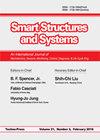Active structural acoustic control using an integrated control system with smart structures
IF 2.2
3区 工程技术
Q2 ENGINEERING, CIVIL
引用次数: 0
Abstract
An integrated control system with smart structure is proposed for active structural acoustic control (ASAC). It is mainly used to integrate the advantages of centralized and decentralized ASAC. Each smart structure contains a relatively independent controller, which forms a distributed control. The coordination and cooperation between smart structures is mainly realized by sending control factors (secondary generalized modal force) from the upper coordination unit (coordination structure) to each smart structure. The control factor can reflect the weight of each smart structure on vibration noise control, and play a key role in noise control. The control factors are extracted from the blend function in the bottom control units (smart structures) and stored in the coordination structure. This design method ensures the consistency of the internal functions of each smart structure and lays a foundation for decentralized control. In addition, whether the control factor is allocated to the smart structure depends on the real-time changes of the sound field. Through the intelligent allocation of the control factors, the global (centralized) control is realized and the coupling problem between smart structures is solved. Since the control system does not have a centralized controller, it appears as a decentralized control in form; at the same time, the centralized control in algorithm is achieved by extracting and redistributing the control factors. Therefore, the control system integrates the advantages of decentralized and centralized control.基于智能结构集成控制系统的主动结构声学控制
针对主动结构声学控制,提出了一种智能结构集成控制系统。它主要用于集成集中式和分散式ASAC的优势。每个智能结构都包含一个相对独立的控制器,形成分布式控制。智能结构之间的协调与协作主要是通过从上部协调单元(协调结构)向每个智能结构发送控制因子(二次广义模态力)来实现的。控制因子可以反映每个智能结构对振动噪声控制的权重,在噪声控制中起着关键作用。控制因子从底部控制单元(智能结构)中的混合函数中提取,并存储在协调结构中。这种设计方法确保了每个智能结构内部功能的一致性,为分散控制奠定了基础。此外,控制因子是否分配给智能结构取决于声场的实时变化。通过控制因素的智能分配,实现了全局(集中)控制,解决了智能结构之间的耦合问题。由于控制系统没有集中控制器,因此在形式上表现为分散控制;同时,通过提取和重新分配控制因子,实现了算法中的集中控制。因此,该控制系统集成了分散控制和集中控制的优点。
本文章由计算机程序翻译,如有差异,请以英文原文为准。
求助全文
约1分钟内获得全文
求助全文
来源期刊

Smart Structures and Systems
工程技术-工程:机械
CiteScore
6.50
自引率
8.60%
发文量
0
审稿时长
9 months
期刊介绍:
An International Journal of Mechatronics, Sensors, Monitoring, Control, Diagnosis, and Management airns at providing a major publication channel for researchers in the general area of smart structures and systems. Typical subjects considered by the journal include:
Sensors/Actuators(Materials/devices/ informatics/networking)
Structural Health Monitoring and Control
Diagnosis/Prognosis
Life Cycle Engineering(planning/design/ maintenance/renewal)
and related areas.
 求助内容:
求助内容: 应助结果提醒方式:
应助结果提醒方式:


